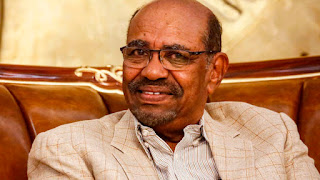Kiir's deputies take oath of office
Report by Radio Tamazuj.org dated 22 February 2020 (JUBA) - South Sudan's opposition leader Riek Machar has been sworn in as first vice-president in a boost for the peace agreement aimed at ending six years of conflict.
Mr. Machar took up the top post under the terms of the 2018 peace deal, implementation of which had been repeatedly delayed by disputes.
The main opposition leader took the oath of office alongside three other vice presidents appointed by President Salva Kiir last night as per the peace deal.
Those appointed vice presidents include James Wani Igga, Taban Deng Gai and Rebecca Nyandeng de Mabior. The fourth vice president position remains vacant as members of the South Sudan Opposition Alliance (SSOA) have not settled on a candidate for the position.
If peace holds, the transitional government of national unity will now have to embark on reforms to pave the way for general elections in three years’ time.
The economy is currently in ruins, nearly five million people need aid and 188,528 people are crammed into UN peacekeeping camps across the country.
The conflict that killed hundreds of thousands of people has spawned a massive refugee crisis, pushing many of those fleeing the fighting to neighboring countries.
Speaking at the presidential palace after taking the oath of office today, Dr. Machar said he is determined to work with President Kiir and other peace partners to end the devastating conflict.
"It is our hope that the formation of the revitalized transitional government will create a new momentum and a new spirit of commitment and cooperation in the implementation process of the agreement in order to avoid the delays experienced during the pre-transitional period," Machar said.
"I would like to reiterate my commitment and the commitment of the SPLM/A-IO to work closely with the peace partners and particularly President Kiir Mayardit to implement the agreement in letter and spirit. May God bless South Sudan," he added.
For his part, President Salva Kiir Mayardit, who called Machar "my brother", said he will work closely with the opposition to establish lasting and sustainable peace in the country.
Kiir advanced a message of reconciliation and forgiveness to his opponents, saying he has forgiven his archrival Riek Machar. “I want to reiterate here and now that I have forgiven my brother Dr. Riek Machar and I also ask for his forgiveness,” Kiir said.
The president also offered a rare apology to the South Sudanese people for the devastating conflict, calling upon internally displaced persons and refugees to return home to rebuild their lives.
“I am inviting the people of South Sudan to forgive one another. Particularly, I want to appeal to the Nuer and Dinka communities to forgive and reconcile with one another,” he said.
“I also appeal to the people of Equatoria, especially those who have experienced much of the devastation to forgive and reconcile,” he added.
The South Sudanese leader called on holdout opposition groups to join the peace process, saying he plans to put an end to the conflict in the world’s youngest nation.
Kiir called on the international community to provide support as all parties to the peace agreement embark on rebuilding the country. [Note from Sudan Watch editor: Get lost Kiir you greedy monster, you've had over 15 years in power. You and your enemy Riek Machar should be in the dock at the International Criminal Court in The Hague begging for mercy for the slaying and starvation of millions of Sudanese and ruination of millions of lives. Or go join your kids in your beloved Kenya and get back under the rock you crawled from. Pope Francis knew he was facing evil when he got down on his knees to kiss your feet. God help you]
POSTSCRIPT
Note that Rebecca Nyandeng de Mabior is a South Sudanese politician. She has served as the Minister of Roads and Transport for the autonomous government of Southern Sudan, and as an advisor for the President of South Sudan. She is the widow of Dr. John Garang de Mabior, the late first Vice-President of Sudan and the President of the Government of South Sudan, and the mother of Akuol de Mabior. She is from the Dinka tribe of Twic East County of South Sudan. Read more at Wikipedia:
Photo: South Sudan's Fourth Vice-President Rebecca Nyandeng de Mabior takes the oath of office in front of Chief of Justice Chan Reech Madut in Juba, South Sudan, on Saturday. ANDREEA CAMPEANU/REUTERS. From China Daily.com: http://www.chinadaily.com.cn/a/202002/24/WS5e5322f3a310128217279ad7.html


Photo: South Sudan's First Vice President Riek Machar takes the oath of office at the State House in Juba, 22 February 2020. REUTERS/Jok Solomun Text by: RFI Full story: http://www.rfi.fr/en/africa/20200223-south-sudan-rebel-leader-machar-sworn-vice-president-civil-war-salva-kiir










